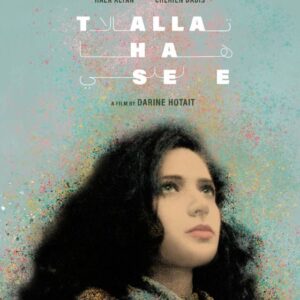“Are you sick?”
The young Rakkan eyes the bright blue hospital band adorning his Aunt Mira’s wrist. He shifts his gaze to meet her face as Mira tucks the bracelet underneath her cream-colored coat. “Let’s go,” she insists, disregarding Rakkan’s earlier inquiry. Mira is, in fact, sick. However, not with an illness worthy of sympathetic flowers and “get well soon” cards, according to her Arab family. Earlier that day, Mira had checked out of the psychiatric hospital treating her for her accidental drug overdose. Rather than the typical wave of prayers and heartfelt messages that usually ensue after a family calamity, Mira’s mental struggles greeted confusion, shame, and a hasty lie concerning an alleged trip to Tallahassee, Florida. Hala Alyan and Darine Hotait’s “Tallahassee,” a short film featured in The New Yorker, follows Mira, an Arab-American woman, as she navigates a family gathering following her dismissal from the psychiatric hospital. She must grapple with her mental struggles in solitude, concealing the truth away with the vibrant blue reminder ornamented around her wrist.
“Tallahassee” transpires during Mira’s grandmother’s birthday. In a Brooklyn brownstone, Mira reunites with family and friends, sharing hugs and exchanging kisses for this sweet celebration of life. She engages in the standard small talk conversations, responding to the anticipated “How are you” and “Where have you been” with as much charisma as one can muster following a visit to a psychiatric facility. However, one seemingly misplaced question enters the mix of typical pleasantries. “Why are you so pale? Don’t they have sun in Florida?” To her surprise, Mira’s sister, Lara, had told family members Mira went on a trip to Florida to account for her two-week absence, a lie to prevent their relatives from worrying.
Mira resentfully follows her sister and mother’s measures to appear as though all is well. She spends moments practicing her smile in front of a mirror, curling her lips into what she hopes is pleasant and convincing. Yet, in a corner away from the party celebrations, Mira grows inert and scatterbrained. She dazes off in the doorway as her relatives carelessly dance to traditional songs in Arabic, the smile she perfected fading away and her gaze losing focus. As the party progresses, Mira finds solace in an unexpected guest, Rakkan, a young boy with a contagious curiosity for the world.
In an interview with the New Yorker, the film’s screenwriter, Hala Alyan, reflects on the Arab community’s reluctance to address moments of sorrow. She wonders whether “having experienced so much of it [sadness] that this is survival—you put lipstick on because life is not going to get any easier?” In the short film “Tallahassee,” Alyan articulates her grievances and skepticism through the simplicity of innocent encounters. She does not overwhelm the film with details of Mira’s diagnosis or the moments that led her to the hospital. She leaves a lot unsaid, enriching the film’s relatability. The film’s directors approach mental illness in Arab communities gracefully. The audience sympathizes with Lara’s efforts, although deceptive, while simultaneously rooting for the film’s protagonist, Mira. They display the complexity of each character within the twenty-two minutes, leaving all “at peace with all the conflict that comes with the situation.”
“Tallahassee” offers an imperative perspective absent in mainstream films and conversations on mental illness. It explores the dynamics of Arab families with authenticity yet subtlety. It captures the small, almost inconsequential, moments typical of every Arab family gathering, from the casual remarks about one’s appearance to the inevitable dances. Above all, the short film acknowledges those who, like Mira, seamlessly tuck away their illness at the risk of burdening others with their pain. As Mental Health Awareness Month comes to a close, “Tallahassee” is a must-watch film exploring the cultural implications of mental struggles.
Discussion questions:
- Why did Lara and her mother feel it necessary to lie about Mira checking into a psychiatric hospital? What does it reveal about how many Arabs may approach issues concerning mental health? How does it relate to your cultural upbringing?
- Do you believe the film had an optimistic tone? Why or why not?
- Why do you think the film’s directors chose not to delve into the details of Mira’s mental illness?


